FluentU Review: Can FluentU Really Make You Fluent?
Is FluentU Worth the Hustle?
The market is flooded with language learning apps. Sadly, many aren’t worth your time and money. App creators stuff their software with all kinds of glittery and bouncing perks to hook language learners. The effectiveness of these features, unfortunately, takes second place in their race for popularity and revenue. Where does FluentU place on this spectrum from "useless but sequined" to "useful but plain"? Find out in this FluentU review.
Nice reviewers keep the suspense till the end. I’m not one of them, so – SPOILER ALERT – I’m sharing my verdict right from the start.
Ready... Steady... Go!
- FluentU will allow you to take a sneak peek into the culture and mentality of native speakers
- FluentU will make a good listener out of you if you’re past your target language basics
- FluentU won’t make you a writing or grammar wizard
- FluentU won’t turn you into a fluent speaker unless you complement it with other resources
But don’t you bury this language learning platform just yet. I, for one, kept it. I’ll explain why in a jiffy.
Why trust (or not) this FluentU review?
Before you read any further, why should you trust my FluentU review? You don’t have to, of course. But to give myself some credibility (a fairly deserved one) because I hold two linguistics degrees, boast 12 years of language teaching experience, and have a command of six (completed) plus two (ongoing) foreign languages.
I know the language learning business inside and out. I can smell a worthless language learning platform and even suspect my Mac is trained to the point where he’d refuse to load a poor language website (good boy).
I’m super cynical and skeptical when I review language learning apps. FluentU isn’t my first nor will it be my last, and it won’t get any special treatment (I don’t play favorites).
How did I decide I needed FluentU, and why do I know it won’t make me or you fluent? I’ve got a subscription and used the service for Spanish (which I speak at an upper-intermediate level), French (which I’ve just started on Babbel), and German (which I teach). I’ve investigated every nook of the FluentU app and website to get my money’s worth (I’m a thrifty woman).
FAQ: Is FluentU a good website?
FluentU is a good language learning platform with some major advantages. It teaches a foreign language with real-world videos on just about every topic and makes the language learning process enjoyable.
What Is FluentU?
FluentU is an educational website and app compatible with IOS and Android. The platform positions itself as an immersive language learning resource – its main asset is an enormous video library, with authentic materials copiously transcribed and translated. This feature is indeed fantastic and makes the platform an industry leader. You can choose the video’s difficulty level (beginner to advanced), topic (virtually anything under the sun), and format (interviews, news, music videos, etc).
Former Harvard law graduate Alan Park, FluentU’s founder, designed this format as he himself found it entertaining and effective to learn languages with movies and TV shows. Having mastered Chinese, Japanese, and Korean by watching videos, the ambitious man decided to relay this wisdom further and motivate millions of language learners around the world to follow his lead.
FAQ: Can you become fluent with FluentU?
Although FluentU offers much value, it uses a passive learning style that cannot elevate you to native fluency. To become fluent in a target language, you need to surround yourself with language resources (movies, books, news, podcasts), communicate with native speakers, and do language courses online or offline. No language learning app can ever make you fluent on its own.
Let's Disassemble FluentU to See What's Inside
Presentation and User Experience 8/10
A Clear Presentation. Without exaggeration, FluentU is the most intuitive and user-friendly app I’ve ever used. It was created with people like me (technologically challenged) in mind. Take the very first look at their homepage, and you have it all within visual reach and a mouse click away. You immediately dive into a brief video introduction and a list of FluentU languages. The platform shows you the app version for download right there, as well.

A concise and structured guide follows on all the features for you to enjoy. If you’re in a rush and in urgent need of a decent learning app right then and there, FluentU sells itself perfectly (even to skeptics like me).
I find the separate "School" tab very useful. As a foreign language instructor, I immediately slip into dreams of how easy my life would be once I got this app. P.S.: My exhausted colleagues who spend hours searching for good content instead of enjoying a summer-evening Aperol feel this pain (FluentU is our Robin Hood, guys).

A Sense of Empowerment and Control. What I also like about FluentU is how it constantly gives you the feeling that it cares about you specifically. You get to choose everything, starting with your daily goal and finishing with the video lessons.
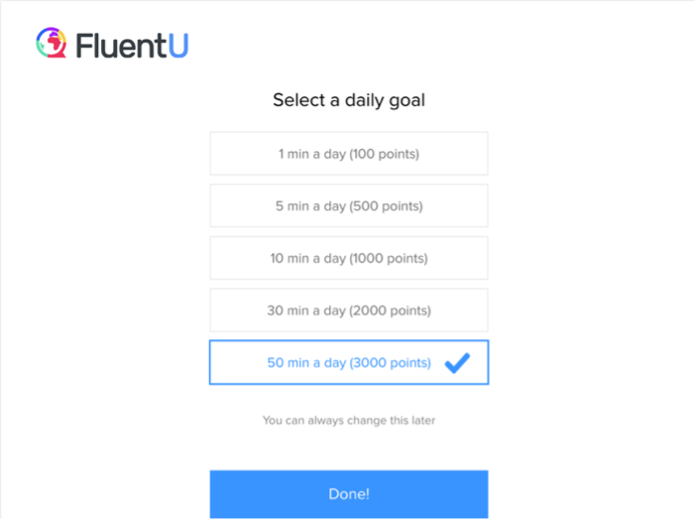
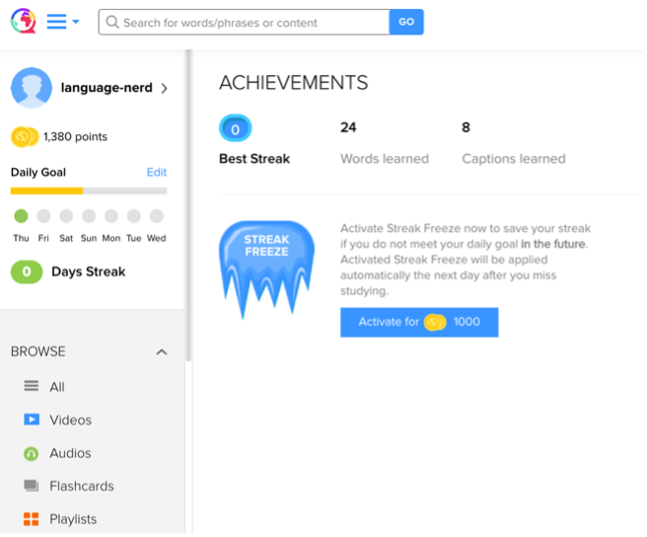
Upon signing up (took me 30 seconds), you'll see your personal profile, which is nothing but intuitive. The "Settings" option on the top right corner lets you upload a photo, decide whether you want a voice-over feature in the word-learning section, and switch between languages and difficulty levels (in case you’re learning a few simultaneously).
You have all the essentials on the left: your username (how cool is mine?), coins earned, and the daily goal tracker. Then comes a list of the features to explore i.e., video lessons, audio lessons, flashcards, and playlists.
The center stage is taken by YouTube videos with a green streak showing your progress with all the videos you've already watched. Play around with topics and difficulty levels as much as you want. Pro Tip: Don’t force yourself into binge watching so as not to end with FluentU burnout (what a condition to get diagnosed with!).

What I also enjoy is how easily you can find the content you want using the search function. Look what I’ve received under "education" in my German course: related phrases, videos by topic, and short video clips by grammar.


Minimalist Design. FluentU’s focus relies on structure, and its design is hardly impressive. I agree that a flashy look is not the main thing, but I’m an aesthetician. If FluentU were a person, it’d be a German man rather than a French woman (no offense to either, but I’m into the Parisian style).
Bottom Line: I can live with FluentU's design, but I’d put a pink ribbon on top if I were its creator (I guess it’s a good thing I’m not).
Content Value - 8/10
Available Languages. FluentU only offers 10 languages: English, Spanish, Italian, German, French, Portuguese, Korean, Japanese, Chinese, and Russian.
While it loses to most competitors in number, it has a qualitative advantage: FluentU’s ESL program is adapted for Korean, Japanese, and Spanish speakers. As an ESL teacher, I can’t stress the value of this feature enough. To me, it negates loads of weaknesses, honestly.

Languages with Different Script Systems. One can immediately see that FluentU is based in Hong Kong – the amount of Mandarin content is amazing (should Mandarin be the next language on my list?).
While the video materials are of high value, don’t even hope to learn the Chinese script (although you’re offered the choice of either simplified or traditional characters). You’d need another app for this (e.g., Rocket Chinese or Mondly). FluentU doesn’t focus on writing practice, much less anything beyond the Latin alphabet.
Disclaimer: I’m still super satisfied with the software’s sensitivity to diacritics in my Spanish course (I always get a hint when I need an é instead of e or an ó instead of o).

Overall, the program is effective for any writing system. I’ve tried Russian and haven’t found any major bugs. Yet, I’ve got two points of critique here. First, the software doesn’t really teach you reading or writing in a new script – it expects you to learn by immersion (that’s close to impossible for some people without additional external input). Second, with languages like Russian (without a strict word order), the system recognizes an alternative answer as incorrect (it isn’t, 100% guaranteed), when it’s different from the one in the video. So, is it "learning" or simply "mechanical memorization", then?

A focus on Listening (at the expense of the other three language competencies). With my hand on my heart, I believe FluentU has no equals when it comes to listening comprehension skills and vocabulary practice. The very idea of using YouTube content instead of artificially creating staged dialogues is genius (after all, we all procrastinate watching YouTube, so why not put this habit to better use?). On top of that, I’m a sucker for FluentU’s hovering translation option embedded in each video.
Now, as great as FluentU is for listening skills, it sucks for reading, speaking, or writing skills. The idea of immersive learning is to let the user... immerse – dive headfirst and learn everything while trying to stay alive. It's workable for a baby learning in the natural environment, but I doubt a baby would subscribe to FluentU. For the price FluentU charges, I expect to be wined and dined rather than be left to do hefty grammar by trial and error.
The fact that all of these language competencies are forgotten by FluentU means you’re forced to look for explanations elsewhere. Now, add the cost of, let's say, Babbel and FluentU. Are you ready to cover the cost of both? For the record, I am, but only because I’m a language addict and that’s my job. I realize it’s too much for an average person learning for fun or for an elderly person who wants to pick up a new language to help stave off Alzheimer’s (did you know it actually works?).
The Choice of Languages and Levels. Not all languages are represented equally on FluentU.
Bad news for those who want to learn Italian, Portuguese, Russian, or Korean: you’re not getting comprehensive courses. These languages are only partially taught. FluentU provides YouTube video lessons and that's about it. That, again, means you need to practice other skills and do drills elsewhere.
Good news for everyone: all the languages are represented in three levels: beginner, intermediate, and advanced. While I strongly doubt you can make a good start as an absolute newbie, you’re covered if you’ve at least reached an A2 level. I also disagree with the idea that advanced learners have nothing to learn on FluentU. The platform has just as much value for you as for intermediate learners. Just make sure you select advanced videos.
Learning Content. FluentU promotes itself as a super-immersive platform, so exercises are not its focus, but rather a supporting structure for videos.
All language lessons start with new words and phrases accompanied by images, and you’re requested to fill in the blank or pick the correct sentence structure using this vocabulary. FluentU presents this practice as "intuitive grammar learning" – you see patterns, memorize, and internalize them. This sounds great in theory. In practice, you miss grammar points (which are only haphazardly available from time to time).
After watching each video, you’re expected to complete a quiz and squeeze the material like a lemon. There's a lot of learner empowerment here. While doing traditional exercises – translation, sentence formation, or multiple choice – you can press the "already know" button on the top right to no longer see a certain word. The system tracks your progress and doesn’t bombard you with something you’ve already memorized (or tell it you’ve memorized to get rid of unwanted vocabulary).
Pro Tip: Don’t press this button before you’re 100% sure you know the word.
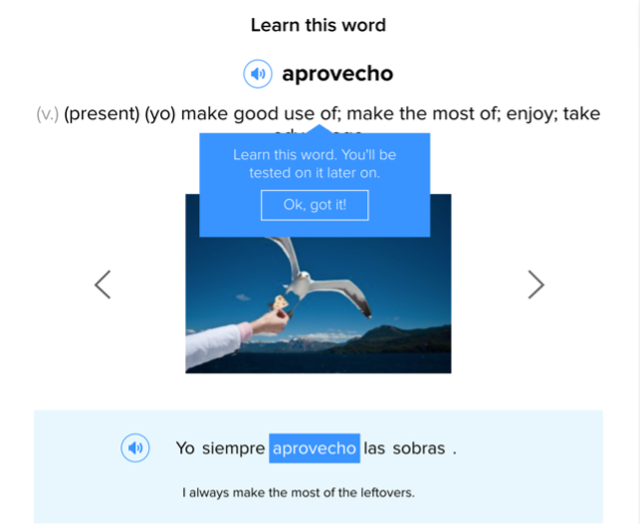
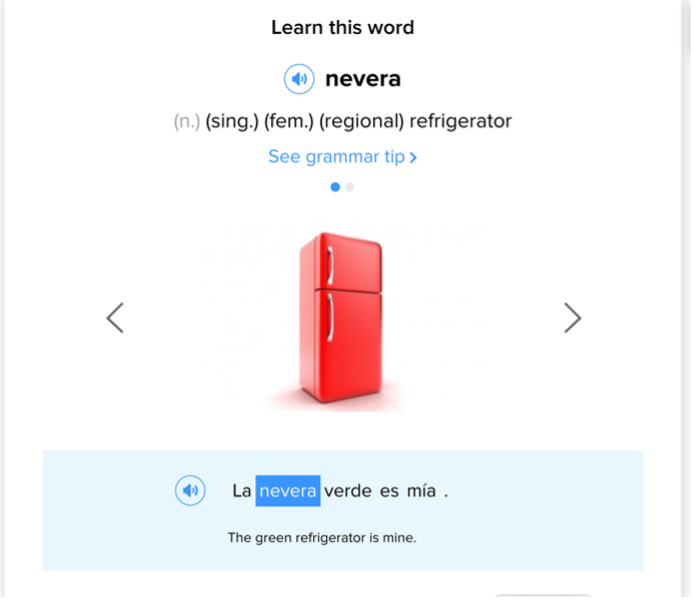
What I love about the quiz activities is that they help you actually learn vocabulary: first, you see words exactly how they’re used in the video (easy-peasy) and then view them in a different context.
I do dislike how these activities are a) super repetitive (even across FluentU courses) and b) often mechanical. I mean, how much brain activity is going on in there when you select the correct translation in this exercise?

Sometimes, I feel that I do the clicking half asleep just to earn some coins and get to the next level. Bottom Line: I tried doing a quiz in intermediate Portuguese (which I don’t speak) and scored 90%. Make your own conclusions.
Flashcards and Vocabulary. I quite enjoy the flashcard function. All words and phrases from your videos are sent there automatically and you're notified when it’s time to review them. A cool feature is that you can also send vocab to flashcards manually - you decide how many words you want to send.
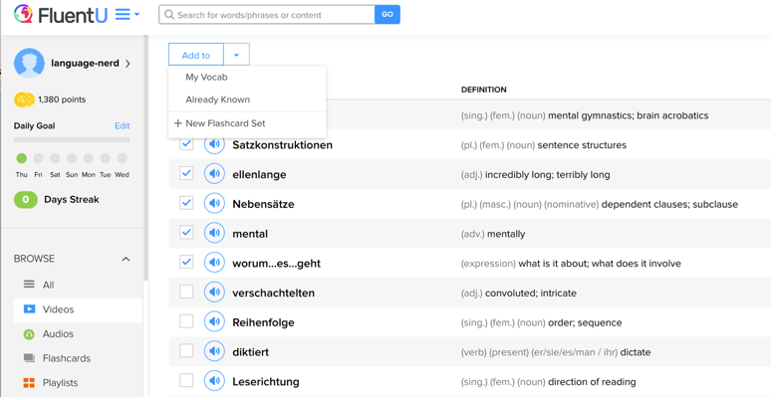

Note: Speaking of flashcards, if you want to know the best five pure flashcards apps for language learning, then check out "The Five Best Flashcards Apps for Language Learning - Are They Good Enough?" These are not like FluentU. These are barebones flashcard apps.
FluentU’s Flagship Features - 9/10
While FluentU creators haven’t invented the wheel, they've offered their own version of a platform that stands out among the most popular language learning apps. To me, there are two major features that make FluentU unique:
FluentU Videos. FluentU is the king of video materials. On the one hand, it might appear super simplistic – not to record your own videos but to use someone else’s. On the other hand, how can intentionally created materials be as authentic and engaging as something that people truly enjoy watching in their free time? Plus, FluentU takes the videos to new heights. Believe me, the platform's developers realize you might want to go on YouTube for free instead of watching (the same) videos for a price tag. So, they’re sweating to make this content worthy.
How does this work? You’re invited to watch a piece on any topic and difficulty level where you can:
a) Pause the video
b) Get the translation right there by hovering a cursor over a new word
c) Move back and forth with arrows
d) Use the loop arrow on the bottom to replay the same part. (Before I subscribed to FluentU, I watched YouTube and swore like a sailor every time I didn’t understand a Spanish word)
FluentU Translator. FluentU's translator is brilliant. Period. It’s true that the idea itself contradicts the "100% immersive learning experience" the platform preaches. Yet, it's 100% more effective to have translation when you're learning a language. FluentU's translator allows you to hover over an unfamiliar word while watching the video (it pauses the video automatically) and see a pop-up picture & word card (in English). This saves so much time and energy (we’ll come up with something just as awesome for our upcoming Flying Languages app, so stay tuned)!

Its Achilles’ Heel - 6/10
I’d love to have these. I'm a super-critical person. So, you might just ignore some of these observations. Scan through them if you don’t want to be disappointed after you’ve paid for FluentU, though.
The offline mode works poorly. Although the service promises you can save materials for later, you’d better not rely on this if you’re planning to be without Internet coverage. While you can do post-video learning, the videos won’t work offline.
You can't sort videos by region. Something I’ve been struggling with is that I can't categorize materials by "European Spanish" and "LatAm Spanish" or "Germany German" and "Austria German". So, I become puzzled with pronunciation and even vocab. While it’s not a feature many other apps have (Yabla does), I’d expect to have this filter for an outwardly video-based platform.
You don’t get to speak. At all. Whereas competitors like Babbel, Rosetta Stone, or Duolingo don’t challenge you to speak either, they do have speech recognition technology. FluentU ignores this aspect altogether (and trains active listeners instead). You'll need to look for speaking practice elsewhere (e.g. on italki).
Pro Tip: Make the best of your language course by pausing the videos, reading the subtitles out loud, and creating similar mock conversations.
You don’t really write anything. FluentU's courses don't teach writing. The most you’re asked to do is to fill in a missing word or place words in the correct order (which isn't the exact same thing as writing). I agree that it tests your syntactic skills, but will you be able to write a birthday card or make a shopping list after you’ve completed a FluentU course? (Am I an ancient dinosaur to care about writing by hand?)
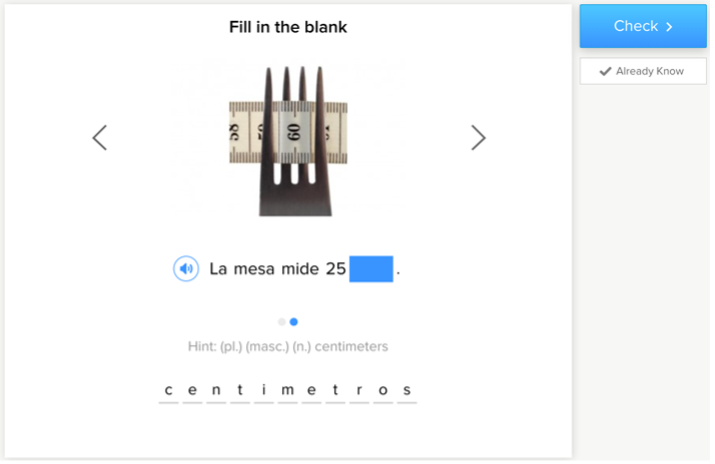
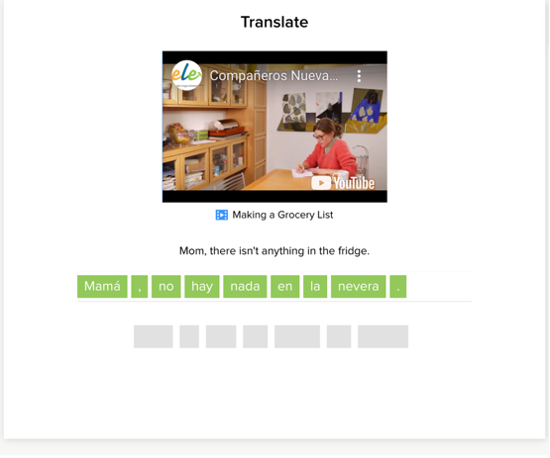
Grammar isn’t emphasized. I’m not one of those who heavily criticize FluentU for lacking grammar. The app certainly offers excellent grammar videos – for instance, you go from preposition recognition to sentence structure. However, these videos are scarce. What’s more, you can't add grammar points to flashcards. At the end of the day, grammar gets lost amid all the vocabulary.
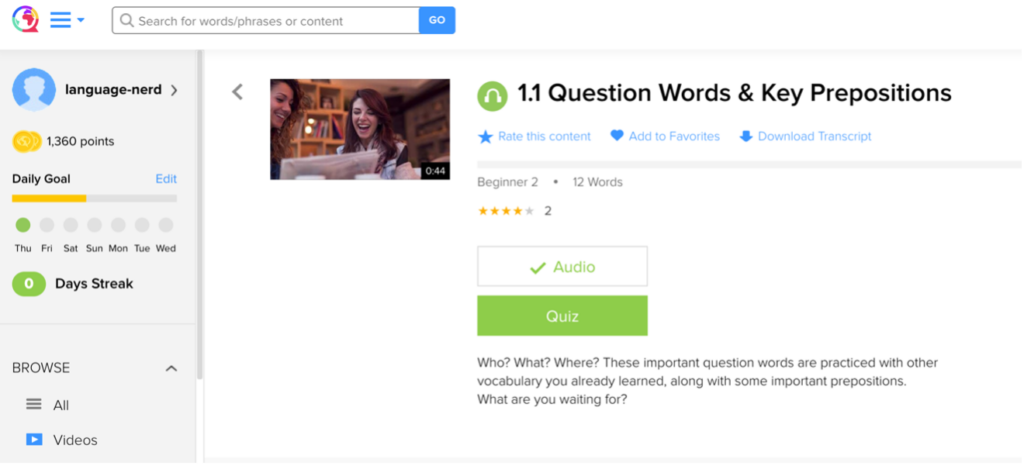
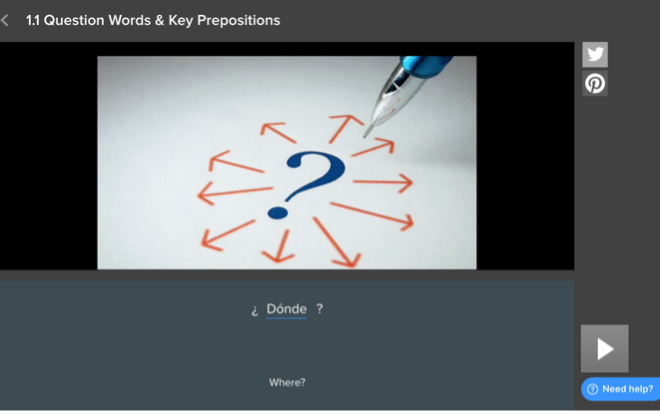
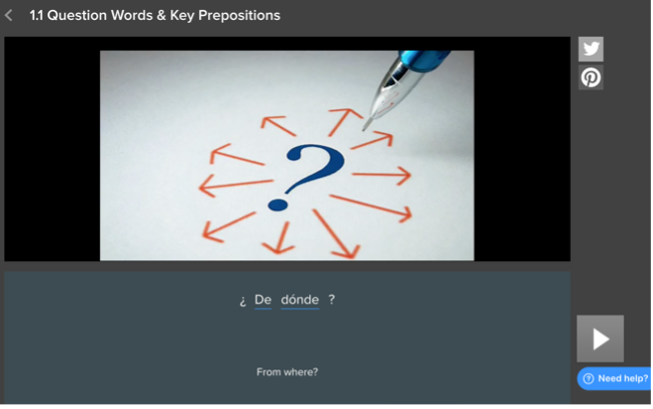
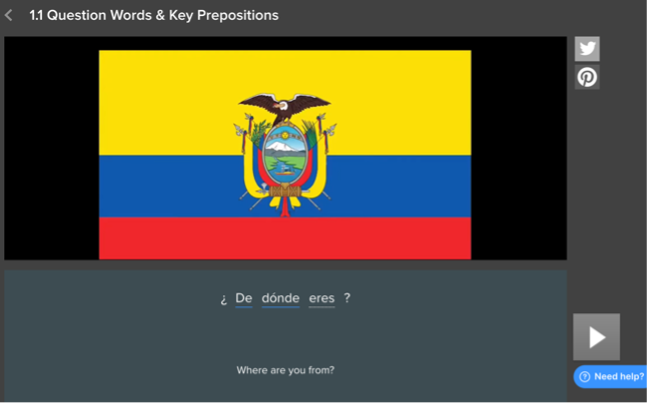
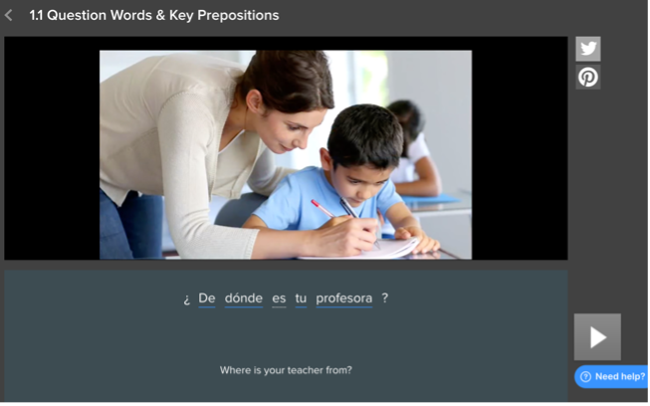
I need more than that. With its video-based approach, FluentU hardly works for complete beginners (unless you’re a genius, unlike me).
I mean, you can do a FluentU quiz haphazardly and learn some words mechanically; yet starting a new language journey without some grammar aid, pronunciation practice, and writing exercises makes no sense.
If you want this platform to pay off, be ready to supplement it with:
- Books, articles, and online blogs/texts
- Grammar guides and pronunciation input
- A teacher’s input or regular chats with native speakers
- Writing exercises (you could use Course Hero for this)
How Much Does FluentU Cost? - 6/10
A Free Trial. It’s virtually impossible to hook customers if you don’t offer a trial. FluentU has a 14-day free trial, during which you can enjoy all the premium features. I strongly encourage you to use this option before you commit to a subscription. I even recommend trials for products I can bet are 100% effective – what works for me might not work for you just "because".
Pro Tip: As you’ll be requested to give your credit card details, don’t forget to cancel the 14-day free trial before it ends (I lost too much money this way, so I’m wiser now).
Subscription Plans. So, the free trial has run out and you decided to commit to FluentU. What are your options? Either:
- pay $20/month with an annual subscription
or
- pay $30/month with a monthly subscription.
Using some math logic, you can see how a yearly plan saves you $120, or four-months’ worth of studying. And, let’s be honest, no one can learn to speak Japanese or Spanish in a month. Don’t even start if you're planning on quitting so quickly (harsh reality).
There’s no free plan with FluentU (shout-out to Duolingo), but that's understandable. Creating so much video content takes hours. Plus, language learners tend to be more committed to a paid course than a free one (I do remember something from my Coursera psychology course, yay).
It’s true, FluentU’s not cheap. What’s also true is that I feel like I’m getting more than my money's worth. FluentU doesn’t charge me separately for every language. I’m doing advanced Spanish and beginner Italian. I’m also learning German (as a fluent speaker) to use as content for the classes I teach. I can start a few other languages if I want to.

Even though FluentU doesn’t offer individual discounts, it's quite generous toward schools. Starting with 40 students, everyone enjoys half of the monthly price ($14.5) and a 90-day trial period. Highly recommended.

FluentU Alternatives - 7/10
Are there any FluentU alternatives? There always are, but not necessarily better ones. Let's see some of the industry’s favorites face-to-face with FluentU:
- FluentU vs Babbel. Babbel’s my personal favorite in the deep pool of language apps for beginner and intermediate learners. It beats Duolingo, Busuu, and Rosetta Stone. Does it beat FluentU? No. Babbel is a more comprehensive app that lets you develop different competencies (albeit I'm not satisfied with its speaking aspect). FluentU, in turn, focuses on listening and vocabulary (at the cost of the other skills). To start a language and get to a certain level, I’d recommend Babbel. To work on upper-level skills (perhaps even after Babbel’s course), I’d go with FluentU.
- FluentU vs Duolingo. Duolingo always has an unfair advantage over the other apps due to its free access plan. While I wasn’t very kind to Duolingo in my review, it’s a decent platform if you’re not ready to spend much money. Plus, Duolingo welcomes absolute beginners, something that’s hard to imagine with FluentU. My tip is to use the free version of Duolingo and invest in FluentU as a complementary tool. P.S.: This format will work best for the four languages FluentU only teaches with videos – Korean, Russian, Italian, and Portuguese.
- FluentU vs italki. Comparing italki and FluentU is like placing a movie and textbook on a weight scale. Which one helps you learn a language better? FluentU’s great for listening, but italki beats it for speaking. Bottom Line: If you want a more structured approach, go for FluentU, but use italki if you plan to take one-on-one tutor sessions.
- FluentU vs Yabla. It’s a close race since Yabla is FluentU’s (non-identical) twin in that they both focus on videos. While Yabla loses in the number of languages offered (only six), it’s twice as affordable, has the filter-by-region function that I miss in FluentU, and provides more variety of activities. I’d probably go with Yabla if I didn’t have the ambition to start Portuguese in the very near future (it’ll be part of my current FluentU subscription).
FAQ: Which is better... LingQ or FluentU?
These are both good language resources. FluentU emphasizes listening comprehension and vocabulary learning, while LingQ focuses on reading comprehension. LingQ wins if you buy a premium subscription - that way, you can practice all language skills, speaking included.
My Final Grade - 7/10
Drumroll... How many stars does FluentU, the star of video content, get? My overall rating is 7/10.
You might be more or less generous than I am. Consider this final list of FluentU’s pros and cons for rating the app.
What I bet you'll love about FluentU:
- One fee for as many languages as you can handle (all 10?)
- Authentic videos tailored to all levels and interests
- Translation and transcription for videos
- A dictionary to create your own pool of vocabulary
- A decent selection of slang phrases and idioms
- A lot of cultural input in videos
- Sentence structure practice right from the start
- Personalized quizzes based on your progress and pace
- Image-based vocabulary exercises for visual learners
What I suspect you might dislike about FluentU:
- The above-average price tag
- A somewhat glitchy offline mode
- A limited language selection
- Repetitive quiz activities and overly simplistic exercises
- Little grammar explanation and revision
- Lack of pronunciation or speaking practice
- Absence of decent writing exercises
- An emphasis on mechanical memorization at expense of creativity
If my FluentU review convinced you this resource is worth exploring, get your subscription here.
Is FluentU a Worthy Resource? Yes.
Does FluentU offer value for your money? Yes.
Is FluentU for me? Well, I’m using it.
Is FluentU for you? It depends. If you’re not a complete language beginner, you appreciate video content, you don’t need a grammar focus, and you practice speaking and writing elsewhere – then yes. FluentU will be your friend for months or even years to come. You still need to view it as one of rather than the only resource to help your language skills skyrocket.
Too many "buts"? I feel your pain. We’re currently working on the Flying Languages app that will tick all the boxes that other apps don’t. Follow us for updates. You’ll be impressed, I swear.
FAQ: Is FluentU any good?
It's a decent language learning tool for intermediate and advanced learners. FluentU's main selling point is YouTube videos, so the platform will surely boost one's listening skills and vocabulary. However, it loses against other language apps in terms of speaking and writing skills.


